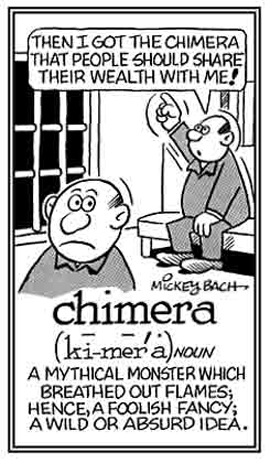Some works of art also showed a goat's head coming up from her back; in fact, the original meaning of chimaira was "young she goat".
The Chimera destroyed everything in her path until Bellerophon (a mythical Greek hero of Corinth), astride his winged horse Pegasus, attacked her from above and killed her with a multitude of arrows.
By the sixteenth century, the chimera had become a symbol of "incongruity and of unrestrained fancy".
Currently, chimera refers to "an unreal or unrealizable creature of the imagination".

Go to this Word A Day Revisited Index
for a list of additional Mickey Bach illustrations.
2. In biology, an organism; especially, a cultivated plant, containing tissues from at least two distinct genetic types, often because of grafting; consisting of two or more genetically distinct cell types, produced as a result of mutation, transplantation, or grafting; the fusing of different embryos, or other similar processes: The fraternal twins were not chimeras as their blood types were different from each other.3. In experimental embryology, the individual produced by grafting an embryonic part of one animal onto the embryo of another animal, either of the same or of different species: There was excitement in the laboratory when a successful chimera from the experimental transplant was announced.
4. A person who, or an organism which, has received a transplant of genetically and immunologically different tissue; such as, bone marrow: The multi stage process resulted in the successful transplant of bone marrow; the chimera who received the transplant is beginning to recover.
Human chimeras were first discovered with the introduction of blood typing when it was found that some people had more than one blood type.
Most of them proved to be "blood chimeras" or non-identical twins who shared a blood supply in the uterus.
It exists in humans most commonly when the blood of dizygous twins mixes in utero (the organ in a woman’s body where babies develop before birth).
Such a case is difficult to recognize in humans; however, it might occur when the blood of monozygous twins (identical twins that originate from a single fertilized egg) mixes in utero; or the hollow muscular organ in the pelvic cavity of a female, in which the embryo (baby) is nourished and develops before birth.
2. A medical patient who has been subjected to whole body irradiation to lower immune responses to foreign donor cells and therefore has the immunological characteristics of both host and donor after a bone marrow graft from the antigenically different donor.
This is achieved by fusing two allogeneic early blastocysts (mammalian embryo at the stage when it is implanted in the wall of the womb) and reimplanting the fusion product into the uterus.
Tetraparental chimeras allow the relative effects of genetic constitution and early environment of the development of immunological tolerance and reactivity to be studied.
